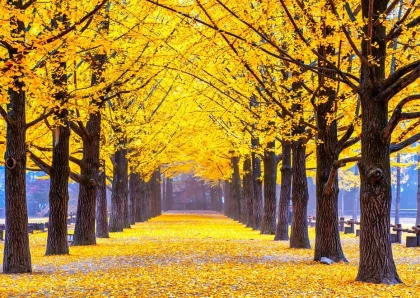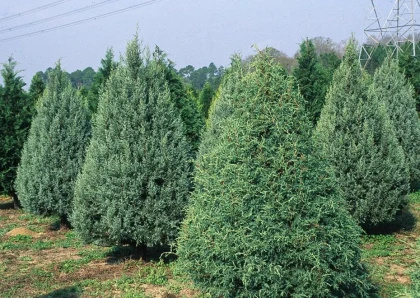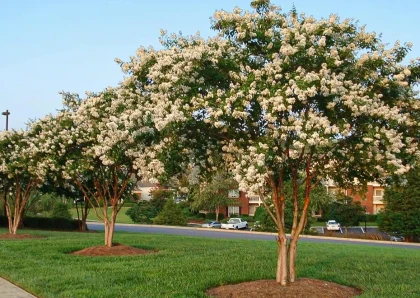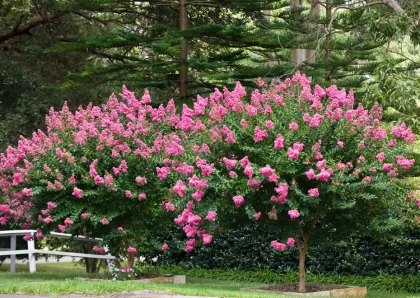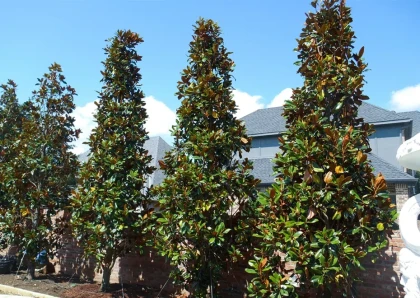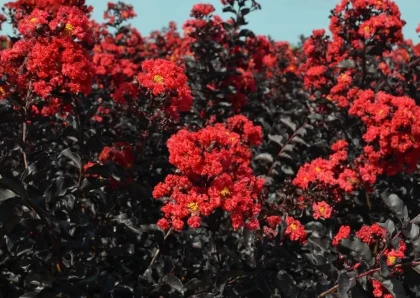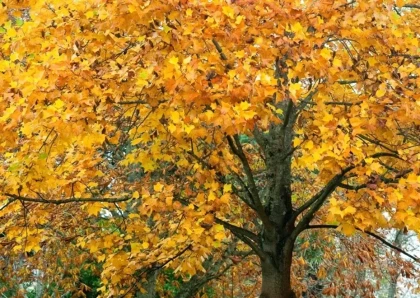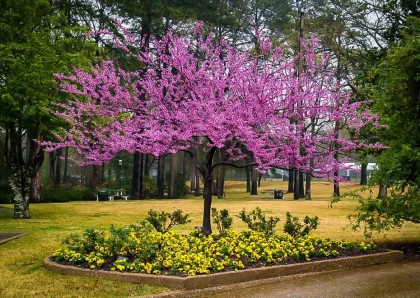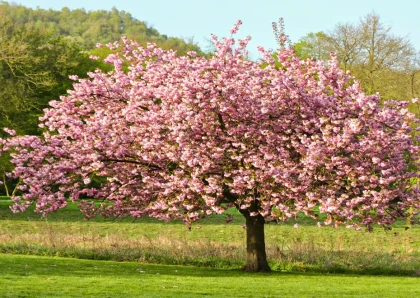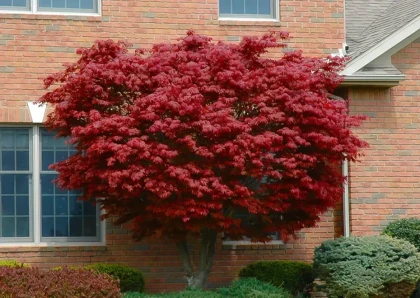
Weeping Tamukeyama Japanese Maple Tree
Overview
History of the Tree
The Weeping Tamukeyama Japanese Maple Tree (Acer palmatum 'Tamukeyama') is a cultivar of the Japanese maple tree, native to Japan, Korea, and China. It was first discovered and cultivated in the Tamukeyama region of Japan in the 18th century. Its unique weeping form and stunning foliage have made it a beloved ornamental tree worldwide.
Detailed Description of the Tree
The Weeping Tamukeyama Japanese Maple Tree is a graceful deciduous tree renowned for its cascading, weeping branches and vibrant foliage. It typically reaches a height of 8 to 10 feet (2.4 to 3 meters) with a similar spread. The finely dissected leaves display a deep red or burgundy color, which intensifies in the fall, creating a breathtaking display of autumn foliage.
Types of this Tree
The Weeping Tamukeyama Japanese Maple Tree belongs to the Acer palmatum species and is specifically classified as a weeping cultivar. There are various other cultivars of Japanese maple trees, each showcasing unique characteristics in terms of leaf shape, color, and growth habit.
Importance of this Tree
The Weeping Tamukeyama Japanese Maple Tree holds significant importance in ornamental gardening and landscaping. Its elegant weeping form and stunning foliage provide a focal point in gardens, parks, and Japanese-inspired landscapes. Additionally, it is highly valued for its ability to create a sense of tranquility and add aesthetic appeal to outdoor spaces.
How to Care for this Tree
Proper care is essential for the health and beauty of the Weeping Tamukeyama Japanese Maple Tree:
- Plant the tree in a location that provides partial shade to protect the delicate foliage from excessive sunlight.
- Ensure the soil is well-draining, rich in organic matter, and kept consistently moist, avoiding waterlogging.
- Apply a layer of mulch around the base of the tree to conserve moisture and suppress weed growth.
- Prune the tree during the dormant season to shape its form and remove any dead or crossing branches.
- Protect the tree from harsh winds and extreme temperatures, especially during winter.
Benefits of the Tree
The Weeping Tamukeyama Japanese Maple Tree offers several benefits:
- Creates an enchanting focal point in gardens and landscapes with its weeping form and striking foliage.
- Adds visual interest throughout the year, with its vibrant red leaves in spring and summer and stunning autumn colors.
- Enhances the aesthetics of outdoor spaces, including Japanese-style gardens and courtyard landscapes.
- Provides a sense of tranquility and peacefulness with its graceful branches and gentle movement.
- Attracts birds and beneficial insects, contributing to biodiversity and ecological balance.
How to Plant this Tree
Follow these steps to successfully plant the Weeping Tamukeyama Japanese Maple Tree:
- Choose a well-draining location that provides partial shade.
- Dig a hole that is wider and slightly shallower than the root ball.
- Place the tree in the hole, ensuring the top of the root ball is level with or slightly above the ground.
- Backfill the hole with soil, gently firming it around the roots.
- Water thoroughly to settle the soil and provide adequate moisture.
- Mulch around the base of the tree to retain moisture and suppress weed growth.
- Monitor the tree's growth and provide regular care as mentioned above.
Different Types of Wood Products
The wood of the Weeping Tamukeyama Japanese Maple Tree is not typically used for commercial purposes due to its smaller size and ornamental value. However, it may be utilized by artisans and woodworkers for crafting smaller decorative items such as bowls, boxes, and specialty furniture.
Cons
While the Weeping Tamukeyama Japanese Maple Tree is highly desirable, there are a few potential cons to consider:
- Requires specific growing conditions: This tree prefers partial shade and may struggle in full sun or intense heat.
- Can be susceptible to pests and diseases: Regular monitoring and appropriate care are necessary to prevent or manage issues.
- May require pruning to maintain its desired shape and form.
FAQs (Frequently Asked Questions)
Q: How tall does the Weeping Tamukeyama Japanese Maple Tree grow?
The Weeping Tamukeyama Japanese Maple Tree typically reaches a height of 8 to 10 feet (2.4 to 3 meters), making it suitable for smaller gardens and landscapes.
Q: When does the Weeping Tamukeyama Japanese Maple Tree display its vibrant autumn colors?
The Weeping Tamukeyama Japanese Maple Tree showcases its stunning fall foliage from late September to early November, depending on the climate and region.
Q: Does the Weeping Tamukeyama Japanese Maple Tree require winter protection?
While the tree is generally hardy, providing some winter protection in colder regions, such as mulching the base and shielding from harsh winds, can be beneficial.
No listings available
Related Products
Questions & Answers
What do you want to know about this product?
Reviews (5)
LeafWhisperer73
Majestic Delight for Your Garden
The Weeping Tamukeyama Japanese Maple Tree has transformed my garden into a tranquil paradise. Its elegant weeping branches and vibrant foliage add a touch of sophistication. Highly recommended!
ArtisticArborist
A Living Work of Art
The Weeping Tamukeyama Japanese Maple Tree is a masterpiece in my backyard. Its cascading branches and crimson leaves create a captivating display. Truly a sight to behold
ZenGardener101
Nature's Serene Sculpture
The Weeping Tamukeyama Japanese Maple Tree brings a sense of tranquility to my landscape. Its graceful form and deep burgundy foliage evoke a Zen-like atmosphere. Highly satisfied!
GardenEnthusiast87
An Enchanting Focal Point
The Weeping Tamukeyama Japanese Maple Tree steals the show in my garden. Its weeping branches create a captivating canopy, and the vibrant red leaves add a pop of color. Simply stunning!
ArborAesthetec
A Timeless Beauty
The Weeping Tamukeyama Japanese Maple Tree is a timeless beauty that enhances any landscape. Its unique form and brilliant foliage provide year-round visual appeal. A must-have for any garden!





